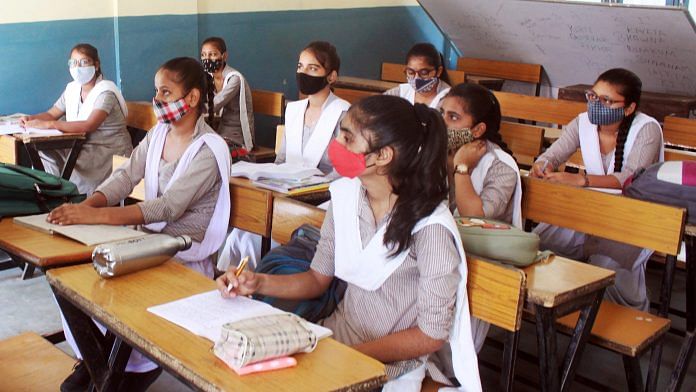New Delhi: Over 90 per cent of teachers in India have faced serious challenges with assessing student learning and over 80 per cent teachers expressed impossibility of maintaining an emotional connect with children during online classes, a study has found.
The study, titled “India Needs To Learn — A Case for Keeping Schools Open”, was conducted as a collaboration between Boston Consulting Group (BCG) and Teach For India, with recommendations from over 35 organisations, including the Centre for Civil Society, Cipla Foundation and the Piramal Foundation.
The study was also supported by public health specialists like Gagandeep Kang, K. Srinath Reddy and Nachiket Mor.
The study used secondary data, or research conducted\data collected by other agencies, including Azim Premji Foundation, UNESCO, World Bank, Rajya Sabha and the Union Ministry of Education.
It found that over 70 per cent of the country’s rural population does not have access to the internet, and 40 to 70 per cent of all students do not have access to a device. Furthermore, it said that the loss in learning suffered during the pandemic lingers on for years before it is set right, and leads to a possible loss in future earnings.
“A student who lost a year of learning will only be able to recuperate in 9-14 years,” it says. In other words, a year’s loss in learning will have a lingering impact in terms of shortcomings in learning for the next 9-14 years before it gets back to an ideal level.
This is based on the findings of a report by the UNESCO Institute of Statistics released in March 2021.
The study also quotes World Bank estimates that said a “year of schooling lost translates to potentially nine per cent lower future earnings for a student”.
The study indicated that, as an outcome of school closure and lack of access, about 90 per cent of children have lost at least one specific language ability.
Also read: ‘Outdoor classes, radio lessons’ — govt teachers suggest hacks as 3rd wave shuts schools again
Huge loss in education
The BCG-Teach For India study did a comparative analysis on school closures in India and other countries highly affected by Covid.
In India, for 2021, it was found that elementary schools have mostly remained shut in 12 of 22 major states. This indicates a massive loss of learning for students up to Grade 8. Secondary schools were shut for 50 to 60 per cent of their usual time in 2021.
By comparison, in China, primary and secondary schools were open for over 90 per cent of the time during the same period. Schools in the US (primary & secondary) were also open for 75 to 80 per cent of the time. The figure for the UK is 70 to 75 per cent and 85 to 90 per cent for Australia.
The study attributed the reason for this to decentralisation of power in these nations — from 2020, many countries have devolved the decisions governing schools to local units from national/state bodies to avoid mass school closures. In the US, district authorities became the governing body on decisions regarding functioning of schools, while Australia and the UK made the school/county the governing body, the study noted.
In contrast, India witnessed schools shut down across entire states, when 70 per cent of districts across 18 major states reported less than 25 daily new cases of Covid-19 in 2021, it said.
‘Last to close, first to open’
Some of the recommendations made by the study include the decentralisation of school governance to the ward level and defining clear norms for school opening and closure. For example, if reopening a school leads to a spike in cases (say if 5 per cent of students test positive), it should be closed for one week.
Pushing for the resumption of physical classes, the report suggests that testing and vaccination need to be amped up in schools, along with devising a robust plan to bridge gaps in learning.
BCG Partner & Director Seema Bansal said “after having worked on education transformation programmes across five states in India, I have personally witnessed the staggering extent of learning loss — more so in rural India, given the digital divide”.
“The need of the hour is to pivot to a mindset where schools are the ‘last to close and first to open; in any future waves of the pandemic or other exigencies (like pollution in north India), as successfully demonstrated by other countries,” she added.
(Edited by Saikat Niyogi)
Also read: 92% teachers have ‘better work-life balance’ due to online classes: Hewlett-Packard survey



